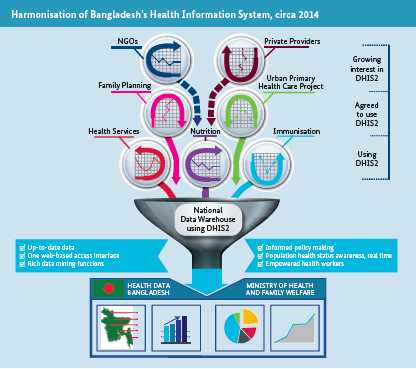A Quiet Revolution: Strengthening the Routine Health Information System in Bangladesh
By Tara Newton, Communications Associate, BID Initiative
Dec 4, 2014
Posted in Policies & Practices, Products

Diagram: Deutsche Gesellschaft für Internationale Zusammenarbeit (GIZ) GmbH, Publisher.
The BID Initiative is not designed to create new information system products and solutions. Instead, our aim is to embrace and extend existing systems and investments made by national governments and their cooperating partners wherever possible.
In October, we conducted a webinar on the Electronic Immunization Registry implementation in Albania. Now, we take a look at a publication: A Quiet Revolution: Strengthening the Routine Health Information System in Bangladesh to learn how the Bangladesh Ministry of Health and Family Welfare (MOHFW) used open source software to enable public health facilities to electronically report routine health information. It is our hope that by learning from what other countries have tested and implemented, we will arrive at a holistic and replicable solution that will result in strengthened immunization systems and overall health outcomes.
Bangladesh’s MOHFW was faced with a highly fragmented and inefficient Health Information System (HIS) which prevented them from properly monitoring the health of the population and targeting health interventions. With the support of the German Federal Ministry for Economic Cooperation and Development, the MOHFW successfully implemented the District Health Information System (DHIS2) open source software. It also promotes the use of routine information for decision-making by training health managers in health informatics, a key component to the BID Initiative’s success.
This approach to HIS strengthening in Bangladesh generated valuable results:
- Dramatically reduced administrative burdens, allowing more time for patients as more than 7,000 health facilities now report routine information electronically through digitization of routine reporting.
- A national electronic data repository signals the end of information silos.
- Use of individual health records track pregnant women and children, improving patient care.
- Better quality and more comprehensive routine information now available from the public sector.
- Improved capacity at Bangladesh’s MOHFW and growing international contributions in eHealth.
Bangladesh’s experience is highly relevant to our work on the BID Initiative and important to keep in mind as we test interventions and develop holistic solutions that are not only scalable, but adaptable for other countries to implement. For example, investing in partners with strong leadership at the country level; taking a comprehensive approach that goes beyond software and infrastructure; and also being flexible and responding to changing needs.
View the full publication: A Quiet Revolution: Strengthening the Routine Health Information System in Bangladesh
